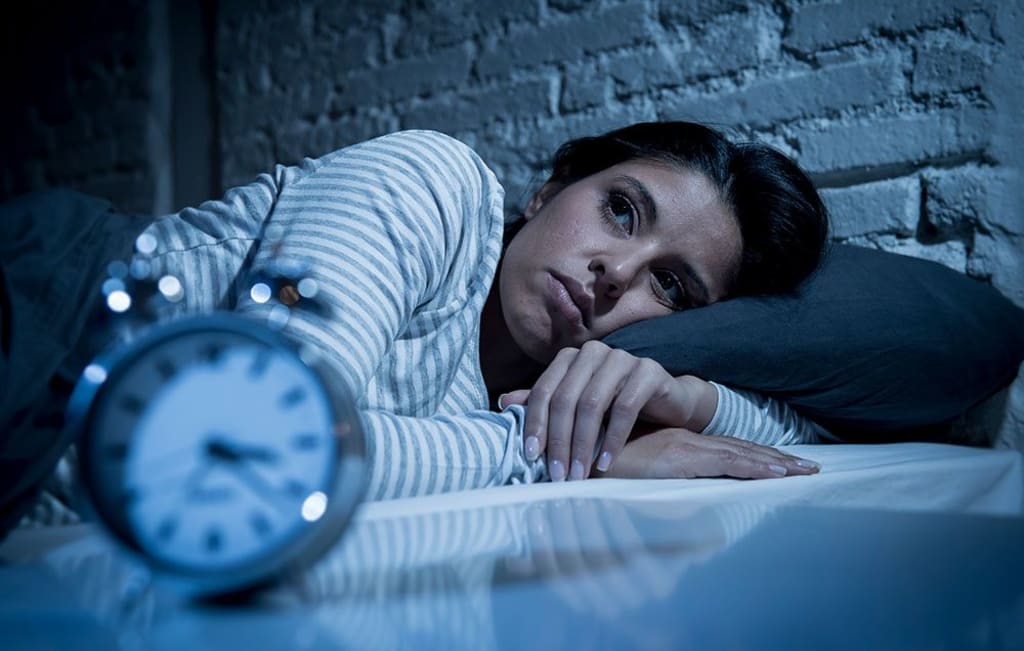This is the reason why you're wide awake at 4am in the morning, as well as the one thing you should never do.
Do you ever lie awake in bed at 3 a.m., perplexed as to why you can't fall asleep?

You are not the only one. According to research, 32 million individuals begin to stir in the morning at exactly 4:05, far before their alarm goes off.
And it's a really difficult situation overall. The habit of getting up too early on a regular basis makes it very difficult to go back asleep and might result in significant daytime sleepiness.
It leaves you feeling exhausted and angry, and, which come as no surprise, it puts you at a higher risk of developing chronic health issues such as cardiovascular disease, high blood pressure, obesity, and depression.
Then why don't you just go ahead and count some sheep?
According to The Sleep Charity, there are various possible causes of waking up at inappropriate times, and the organisation has offered strategies to take to reduce the likelihood of this happening to you.
Low blood sugar and hormones both have a role.
Our circadian rhythm, also known as our internal clock, is a timekeeping mechanism that runs on a 24-hour cycle and tells our bodies when it is time to sleep. Sleep is governed by this rhythm.
The amounts of two hormones, melatonin (which regulates sleep) and cortisol (which regulates stress), are responsible for its regulation.
While cortisol is responsible for getting you up and keeping you awake, melatonin helps you nod off at bedtime and then helps you remain asleep throughout the night.
It's possible that your sudden alertness is the result of an abnormally high level of cortisol, which may be caused when blood sugar is too low.
When there is a dip in blood sugar, your body will work to protect you by attempting to increase it. The cue, the cortisol, and the unwelcome attentiveness it causes.
How to put a stop to it
It is quite unlikely that you would have feelings of hunger in the middle of the night if your blood sugar drops, which is one reason why some individuals have trouble making the link between the two.
Experimenting with different options for your evening meal or snack may help lessen the number of times that you awaken at ungodly hours.
Choose foods that are strong in protein and magnesium, such as hard-boiled eggs, cottage cheese, pumpkin seeds, spinach, dark chocolate, cashews, chicken thighs, or turkey, instead of sweet or carb-based snacks. Eggs, turkey, and chicken thighs are all good options.
Magnesium is believed to promote sound sleep, while protein may help alleviate some of the discomfort associated with midnight hunger.
The menopause
There is a close connection between the hormones that regulate sleep and relaxation, melatonin and serotonin, and the reproductive hormones, oestrogen and progesterone.
When oestrogen levels begin to drop, both before and throughout menopause, this may cause melatonin to become disrupted, which means that it is unable to maintain a healthy balance with cortisol.
When this does place, one's capacity to go asleep and remain asleep is disrupted.
The occurrence of hot flashes, nocturnal sweats, dry skin, and a decrease in libido are all potential symptoms of declining oestrogen levels.
How to put a stop to it
Throughout the course of the day, you should make an effort to include in your diet foods that have a high concentration of phytoestrogens.
This will mimic the natural oestrogens that are prevalent in your body, which have the ability to attach to the receptors in your body and generate effects that are comparable.
Tofu, tempeh, edamame, miso, soy milk, cabbage, garlic, onion, spinach, cauliflower, and broccoli are all excellent sources of phytoestrogens. Other excellent sources are lentils, kidney beans, chickpeas, and cabbage.
You might also try eating eggs and milk, both of which have oestrogen in them.
Investing in high-quality materials, such as those made of 100 percent cotton and linen, which do not retain heat and wick away perspiration, can also help lessen the effect of hot flushes, which may prevent you from getting a good night's sleep.
Inappropriately active bladder
Because your body is still hard at work breaking down everything you had the previous day, it is normal for you to wake up sometimes wanting to use the loo. This is because your body is still working hard to do so.
But if it occurs many times during the night, as Lisa pointed out, this might be an indication of an underlying illness known as nocturia.
How to put a stop to it
The National Health Service (NHS) recommends that individuals drink six to eight glasses of fluid per day, which is about equal to one and a half gallons.
I recommend striving to accomplish this amount before 7 o'clock in the evening and having no more than one glass during the preceding two hours before going to bed.
Consider taking moderate sips rather than gulping down large gulps of liquid throughout the day and night.
The effects of stress and working through feelings
The first part of the night is spent by our brain organising memories, and the second part of the night is spent doing the same thing but with our feelings.
It's possible that people's involuntary wake-up calls are being caused by rising cortisol levels, along with the release of emotions around 4 in the morning.
Everyday pressures may also cause cortisol levels to rise, and if you've had a particularly stressful day, you may find that you have troubling thoughts throughout the night that manifest as nightmares and startle you up at four in the morning.
How to put a stop to it
Your body triggers a reaction known as the sympathetic nervous system, sometimes known as the 'fight-or-flight' response, whenever you are exposed to stressful stimuli such as anxiety or annoyance.
The state of your brain abruptly shifts from that of sleep to that of wakefulness.
You are able to battle this by activating your "rest-and-digest" mode, also known as the parasympathetic nervous system (PSNS), which slows down our heart rate and breathing rate, reduces our blood pressure, and improves digestion.
You may activate your PSNS by consciously slowing down your breathing as follows: take a four-count inhalation via your nose, hold it for a four-count, and then take a four-count exhalation through your mouth.
Continue doing this for up to ten breaths, and if you want to get more out of the practise, raise your count from four to six each time.
You might also try listening to music with a frequency of 432 hertz, which, according to the research of certain experts, helps to relax both our bodies and our thoughts.
Hugging produces oxytocin, which is known as the bonding neurochemical, and helps transmit messages of safety to the autonomic nervous system. If you and your spouse sleep in the same bed, you may want to snuggle with one another.
And yawning, even if it doesn't come easily to you, may also boost the parasympathetic nervous system.
Changing sleep patterns brought on by ageing
Each sleep cycle lasts about an hour and a half, and humans typically experience five cycles during the course of a single night. These cycles alternate between rapid eye movement (REM) sleep and non-REM sleep.
In addition, the level of difficulty associated with waking up increases incrementally from stage to stage.
Because we go through more of the lighter sleep phases in the second part of the night, we are more likely to awaken during the limited periods of time that we are awake. This is because lighter sleep stages are associated with less deep sleep.
If you go to bed and wake up at the same time every night, you have a good chance of entering the lighter stage of sleep and awakening at around the same time.
Because of the changes that occur in our circadian rhythm as we get older, we experience less of the deep, restorative sleep (stage three) and more of the lighter sleep. This means that adults may begin to wake up more often and may also suffer a reduction in the amount of time they spend sleeping.
How to put a stop to it
First, figure out when you sleep best. You can use The Sleep Charity's tool to do this.
First, multiply 90 minutes by 5 (the amount of cycles per night) to get 450 minutes, or 7.5 hours.
If you have to get up at 7am, count back 7.5 hours to figure out when you should go to bed, which is around 11.30pm.
Make sure you're in bed and ready to sleep before then, and give yourself 15 minutes to fall asleep.
It's important to remember that this is just a guide, and you should always work on how you feel when you wake up.
Link in the brain
Our brains are great at making connections between things.
If we wake up often in the middle of the night and try for hours to fall back asleep, our thoughts start to associate the bed with being awake and worried, not with sleep.
What to do?
Stop doing it by getting up.
Even though it seems strange, if you can't fall asleep after 20 minutes, get up and do something peaceful.
make a plant tea like chamomile, lavender, peppermint, or Valerian root without turning on a bright light.
Lack of sleep
Lastly, you may have insomnia if you often wake up in the middle of the night.
The NHS says that people with this condition have trouble getting to sleep or staying asleep long enough to feel rested the next day.
What to do?
You can try a lot of different things. Some of these are going to bed and getting up at the same time every day, relaxing before bed, using thick shades or blinds, not watching TV or using your phone in bed, and not taking naps.
You should also cut down on the amount of coffee and booze you drink and avoid big meals and hard exercise a few hours before bed.
See your doctor if your symptoms are getting in the way of your daily life.
Things you never should do
Now that you know what you should do, here is what Lisa says you should never do if you wake up at 4am.
1. Don't get your brain going.
Checking your email, looking through social media, or watching TV can be very exciting. This can make it hard to relax and fall back asleep.
the bright lights and mental excitement can make it even harder to get to sleep and wake up at the right time.
Instead, do things that will help you calm down, like reading a book or listening to soothing music.
Don't get caught in the nap trap.
Even if it seems like a good idea, don't take long naps during the day, especially if you always wake up at 4am.
Lisa, who works for a company called Simba that makes sleep technology, said that naps can mess up your sleep drive and make it hard to fall asleep at night.
If you really need to sleep during the day, do it before 3 p.m. and don't sleep for more than 20 minutes.
3. Stay away from the craze
Don't let coffee and smoking keep you up all night by avoiding them six hours before bedtime.
Instead, making a warm mug of golden milk, which is a traditional Ayurvedic drink made with turmeric, ginger, and warm milk.
Curcumin, which is found in turmeric, may help you sleep better and stay asleep longer. It may also help reduce pain and inflammation.
4. Don't make a fuss about sleep potions
Even though sleep aids might seem like a quick fix, using them often can make you dependent on them and hide the real reasons why you wake up early in the morning.
It's best to only use them occasionally and get advice from a medical worker on how to do so.
5. Don't lie in bed all day
When you wake up at 4 a.m., you might want to stay in bed and try to go back to sleep.
But you should get up if you have been awake for more than 20 minutes.
If you stay in bed, you may start to associate being awake with being in bed, which will make it even harder to fall asleep in the future.
6. Don't give in to the urge to turn on the "big light."
Lastly, if you wake up, you might want to turn on a bright light, but this can tell your brain to stay awake.
If you do get up, try to keep the light as low as you can while still being able to see well enough to be safe.
About the Creator
Jacob Damian
Whether you're looking to learn something new, explore different perspectives, or simply satisfy your curiosity, I can offer you insights and perspectives that you may not have considered before. With my ability to process and analyse.






Comments (1)
This is such an actionable post - I tend to wake up around time, someone even told me it's a good time to meditate - but I'm sure it's the bladder. Haha, have since minimised drinking water after 7/8pm.